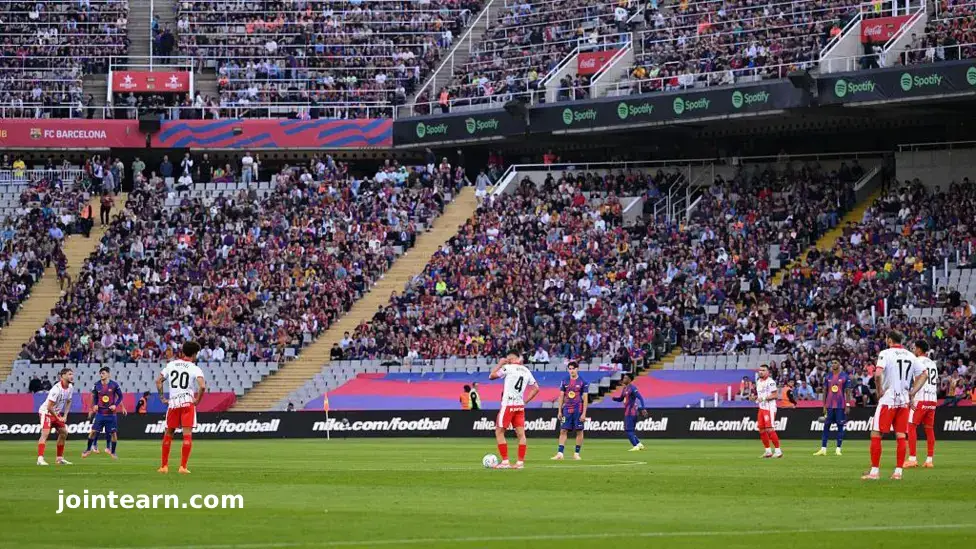
Madrid, Spain – October 18, 2025: The wave of player protests across Spain’s top football division continued on Saturday, as teams in La Liga stood still for the first 15 seconds of their matches to demonstrate against the league’s decision to stage an upcoming fixture in Miami, USA.
The coordinated protests—seen in high-profile fixtures involving Barcelona, Girona, Atletico Madrid, Osasuna, Sevilla, Mallorca, Villarreal, and Real Betis—mark a united stand by players, clubs, and fans frustrated by what they describe as La Liga’s “lack of transparency and dialogue” regarding international expansion.
Players Unite in Symbolic Protest
At the Camp Nou, both Barcelona and Girona players stood motionless after kick-off, silently protesting before resuming play. Barcelona went on to win the Catalan derby 2-1, but the political and sporting message was impossible to miss.
Television cameras notably avoided wide-angle shots of the protests, instead focusing on close-ups or cutting to stadium exteriors—just as they had during Oviedo vs Espanyol on Friday night, when the standstill demonstrations first began.
Similar acts of defiance were also observed at Sevilla vs Mallorca and Villarreal vs Real Betis, ensuring the protest was visible in nearly every major La Liga game this weekend.
Why Are La Liga Players Protesting?
The protests were triggered by the Spanish Football Federation’s (RFEF) approval of a plan to move Villarreal’s home match against Barcelona to the Hard Rock Stadium in Miami on 20 December 2025.
The move was intended to expand La Liga’s international footprint, but players, clubs, and fans have condemned it as unfair and commercially driven.
The Spanish Footballers’ Association (AFE) released a statement explaining that they had coordinated with all La Liga captains to protest the league’s “lack of transparency, dialogue, and coherence.”
While the AFE initially advised Barcelona and Villarreal not to participate—so as not to single out the teams directly involved—both squads joined in solidarity with their peers.
“We were not part of the planned protest, but we felt we needed to show respect for our fellow professionals,” said Barcelona midfielder Pedri after the match.
La Liga Responds to Player Criticism
La Liga officials have rejected claims of poor communication, saying they remain open to “useful dialogue” with the AFE to explain the Miami project and its long-term goals for Spanish football’s global growth.
However, the AFE maintains that the league’s approach has been unilateral and dismissive of player concerns. Their latest statement rejected “a project that does not have the approval of the main players in our sport” and called for “a proper negotiating table” to ensure that player rights, labor protections, and regulatory compliance are respected.
“We believe in dialogue,” the AFE said, “but it must be based on respect and transparency, not imposition.”
Coaches and Clubs Add Their Voices
The controversy has spread beyond players to club managers and executives.
Real Madrid head coach Xabi Alonso voiced his disapproval ahead of his team’s match at Getafe, stating:
“We are against the Miami match. It distorts the competition. There hasn’t been unanimity or consultation for such a major decision. The protests are positive—they reflect a shared sentiment across the league.”
Barcelona head coach Hansi Flick echoed similar frustrations on Friday:
“My players are not happy, and neither am I. But La Liga decided that we will play this game. We have to follow the rules.”
Even within club management, opinions are divided.
Barcelona president Joan Laporta called the Miami event “a great show and a chance to promote La Liga globally,” while Real Madrid released a statement warning that the move could have “serious consequences for the integrity of the competition.”
International Reactions and Broader Impact
The Spanish debate mirrors recent developments in Italian football, where the FIGC approved a Serie A fixture between AC Milan and Como to be played in Perth, Australia, in February 2026.
UEFA has reluctantly approved the Miami plan but warned that future overseas matches could raise “competitive and regulatory challenges” for European leagues.
Meanwhile, RFEF president Rafael Louzan defended the decision, calling it “good for football” and emphasizing Spain’s global ambitions. Still, the continued protests suggest that unity within the Spanish game is far from achieved.
What Happens Next?
The AFE has confirmed that standstill demonstrations will continue across all remaining La Liga fixtures this weekend, with players expected to maintain the 15-second protest at kick-off until meaningful discussions with the league take place.
With growing public support and widespread player participation, La Liga’s leadership faces mounting pressure to justify the Miami decision—or risk deepening divisions between management, clubs, and the very players who make the league thrive.


Leave a Reply